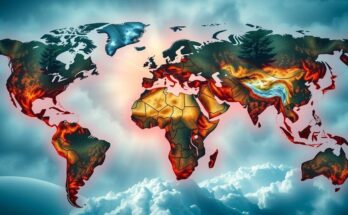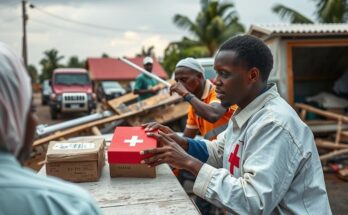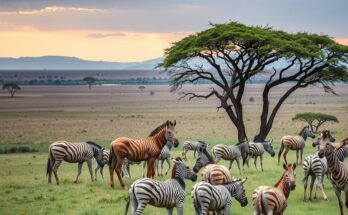Southern Africa is facing a historic drought, declared the worst in a century, with over 27 million lives impacted and 21 million children malnourished. The crisis spans several countries including Lesotho, Malawi, Namibia, Zambia, and Zimbabwe, all of which have declared national disasters. The drought, exacerbated by El Niño and climate change, has destroyed crops and livestock, leading to severe food shortages and potential humanitarian catastrophe.
The Southern African region is currently facing an alarming humanitarian crisis due to what has been deemed the worst drought in a century. An estimated 27 million individuals are affected, with the World Food Programme (WFP) highlighting that 21 million children are suffering from malnutrition as a direct consequence of the prolonged drought. Countries such as Lesotho, Malawi, Namibia, Zambia, and Zimbabwe have urgently declared national disasters in response to the drought, which has severely impacted agricultural productivity by destroying crops and livestock. The situation is dire, with Angola and Mozambique also grappling with significant drought-related challenges. The WFP anticipates that the crisis will worsen until the next harvest season expected in March or April of next year. Tomson Phiri, a spokesperson for the WFP, stated emphatically, “A historic drought – the worst food crisis yet – has devastated more than 27 million lives across the region. Some 21 million children are malnourished.” October heralds the beginning of the lean season for agriculture in Southern Africa, and projections suggest that conditions will deteriorate month by month leading to the next harvest. The resultant crop failures and livestock losses have caused individuals to struggle significantly, with many lucky to obtain even a single meal per day. The reliance of tens of millions on small-scale, rain-fed agriculture has exacerbated the crisis, as the El Niño phenomenon has contributed to below-average rainfall across the region. This drought has been made more severe by increased temperatures associated with climate change. As per reports, the drought has led to an unprecedented devastation of agricultural yields, erasing 70% of Zambia’s harvest and 80% in Zimbabwe, according to Lola Castro, the WFP’s acting regional director for Southern Africa. Additionally, the drought has severely curtailed hydropower output, resulting in widespread electricity shortages. Both Zimbabwe and Namibia have resorted to culling wildlife, including elephants, to alleviate food shortages among their populations. Specialists have identified sub-Saharan Africa as highly vulnerable to the impacts of climate change owing to its reliance on rain-dependent agricultural practices. Due to the financial constraints faced by many poor nations, they lack the means necessary to implement climate resilience strategies crucial for safeguarding lives and livelihoods against such climatic adversities. Experts continue to highlight that climate-induced droughts and erratic weather patterns have a detrimental effect on crop yields and quality.
The background of this article centers upon the persistent drought conditions experienced in Southern Africa, recognized as the most severe in a hundred years. The region is heavily reliant on agriculture, with a significant portion of its population dependent on rain-fed farming for sustenance and economic stability. The El Niño weather phenomenon, identified as a catalyst for reduced rainfall, coupled with climate change, has accelerated the deterioration of agricultural production. The WFP has issued warnings in light of these developments, recognizing the urgency of intervening to mitigate the impending humanitarian disaster.
In summary, the severe drought affecting Southern Africa has precipitated a crisis of unprecedented proportions, leaving millions in jeopardy of food insecurity and malnutrition. The agricultural sector’s reliance on rainfall highlights the precariousness of the region’s food security, made worse by climatic changes that threaten both livelihoods and survival. Urgent international assistance and sustainable climate strategies are paramount to avert a catastrophic future for the millions affected.
Original Source: www.aljazeera.com




